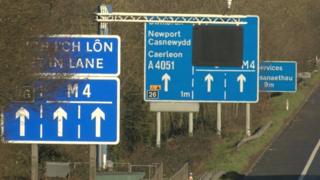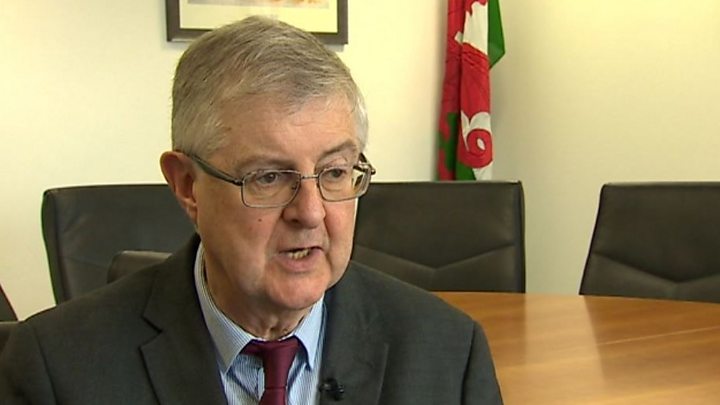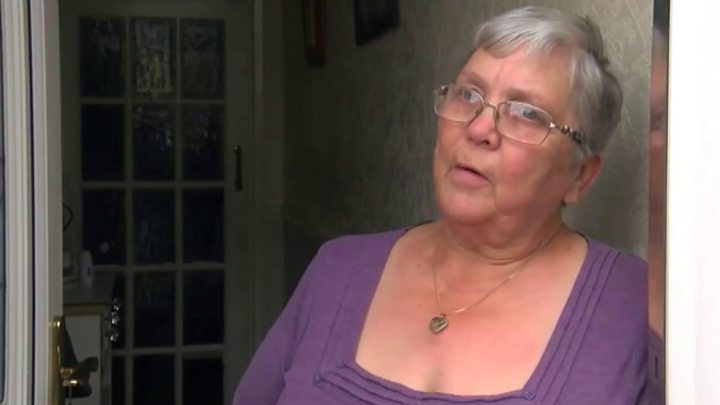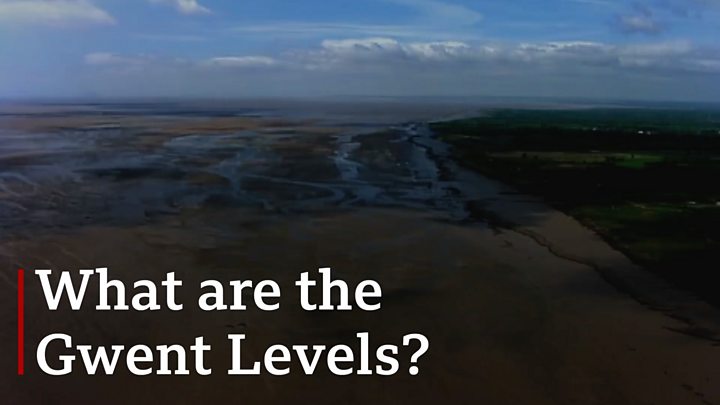
Arguments for and against building an M4 relief road have been going on for decades
The axed M4 relief road motorway project has cost taxpayers £114m since 2013, the Welsh Government has said.
First Minister Mark Drakeford scrapped the £1.6bn scheme, and announced a commission to look at alternatives to tackle congestion, on Tuesday.
The figure is up on, and includes, the £44m spent on a public inquiry.
His Transport Minister, Ken Skates, has not ruled out building a new relief road if it met cost and climate change concerns.
Mr Drakeford said the scheme would damage the Gwent Levels. A planning inspector had said there was a compelling case for the project.
Ministers are to also explore the operation of junctions to reduce the load on the Brynglas tunnels, as part of a set of short-term measure including more traffic controls and a driver behaviour campaign.
- M4 relief road axed over cost
- As it happened: Reaction to M4 relief road scrapping
- What do people living near the M4 think?
It comes after Wales’ Economy Minister Ken Skates announced on Wednesday that the commission of experts to find ways to ease M4 congestion at Newport will make initial findings in six months.
He said it will look at all the 28 alternatives – which had been rejected by the inspector Bill Wadrup – proposed to the inquiry.
It is understood that the Welsh Government will not rule anything out of the commission’s deliberations – including shutting junctions.
It will be chaired by Lord Burns – current chairman of Ofcom, former permanent secretary to the UK Treasury and ex-chairman to Dwr Cymru Welsh Water’s holding body, Glas Cymru.

In a statement to AMs Mr Skates said the “£114 million spent since 2013 developing the proposals” will not be wasted and “will be put to good use by the commission, making sure it is fully informed in terms of transport modelling, environmental surveys and all the other factors in play across the region”.
Currently tailbacks often occur around the Brynglas tunnels on the M4 when traffic is reduced from six lanes to four.
The relief road had been supported by Mr Drakeford’s predecessor Carwyn Jones, and scrapping the plans broke a Welsh Labour manifesto pledge from 2016.

Speaking to Claire Summers on BBC Radio Wales, Ken Skates said Lord Burns, an economist, and a “small team of transport experts” will analyse alternative options.
“What we do recognise is that no single alternative would have the beneficial impact the black route would have,” he said. “However, the sequence and combination of alternatives could significantly reduce congestion.”
“In terms of additional interventions we’ve said we wish to see the commission come forward with its recommendations on an interim basis within six months.
“However if they bring forward compelling and deliverable projects that could enhance the traffic flow along the M4 and if they offer value for money before those six months then we will be considering them and implementing them as soon as possible.”
Mr Skates said some proposals, like “a greater use of alternative routes”, needed to be examined, including the Heads of the Valleys A465 road, which he said “could remove many thousands of vehicles from the M4” by allowing traffic from the north and Midlands to bypass Newport, as well as feeder roads such as the A449 through Monmouth.
‘Not contribute to climate change’
Bus routes and services, rail enhancements also need to be “carefully considered”, he said.
Mr Skates, in a later interview, said “road-based solutions could be part of the consideration of the commission”.
Any proposal that is made must address the concerns that the First Minister has raised over the M4 project, he said.
Asked to confirm if another relief road could be built as long as it was cheaper, Mr Skates told the BBC’s Wales Live programme: “It would have to meet the requirements of the First Minister – for example that it cannot be unaffordable and that it must meet all of the safeguards for the future of the environment and not contribute massively to climate change.”

What did the inspector say?
The planning inspector Bill Wadrup was damning about the potential for public transport to reduce congestion on the M4.
“The evidence is clear,” he said, “that the congestion on the M4 could not be addressed by public transport improvements singularly or in combination”.
Worse, he said delays incurred by a further analysis of public transport ideas “would only cause the acute problems to fester appreciably”.
He also dismissed all of the alternatives that had been given to the inquiry, and said eight of them, according to the report, were withdrawn by those who had submitted them.
“I am certain that none of the strategic alternatives advanced by objectors was better than the published scheme,” he wrote.
The blue route – an alternative promoted by Plaid Cymru and others – “would create problems of visual obstruction, noise and air pollution in urban Newport, and perpetuate avoidable carbon-burn and local air pollution in the long term”.
His report said evidence “proving the persistence of current unsatisfactory conditions was overwhelming”, and that without the M4 relief road stop-start traffic would be the norm for many hours of the day with worsening conditions on the A48 and increases in traffic.
“I conclude that conditions on the existing M4 are already regarded as being unacceptably bad to the majority of the public,” he wrote.
‘No blank cheque’
Mr Skates’ statement says the commission will need to consider “the needs of current and future generations” and take into account “the report of the Commission on Climate Change” and other social, economic, cultural and environmental issues.
It will consider the views “of all stakeholders”, it said, including the future generations commissioner Sophie Howe, business and environmental groups.
It warns, however, that there will not be a “blank cheque” to pursue pet projects.
The first minister told AMs on Tuesday the commission would be guided by Welsh ministers’ ambitions to develop a high quality “integrated and low-carbon transport system”.
Heather Myers, chief executive of the South Wales Chamber of Commerce, said the business community was “disappointed, exasperated and frustrated” by the decision to scrap the relief road.
“We want to have answers quickly. We have been 20 years waiting for this and we still have no plan B.
“Nothing I have seen so far will replicate what the black route would’ve brought us,” she added.
A former chair of Welsh Labour said members would be be feeling “frustration and disappointment” over the move.
Mike Payne from the GMB union is a member of Labour’s Welsh Executive Committee (WEC).
He was on the WEC when the party’s 2016 election manifesto, which included a promise to build a relief road, was agreed and said failing to deliver that commitment would bring a “backlash” if an alternative is not found quickly.
Mike Payne says “there needs to be an alternative fairly quickly”
Mike Payne told BBC Wales Live: “Disappointment is going to be the over-riding feeling from those people [who agreed the 2016 manifesto].
“We’ve invested a lot of time, there have been a number of commissions previously, a lot of people looked at this.
“The inspector that has come up with the report now said this is the preferred route, this is what he would have recommended that Welsh Government implement.
“Now we’ve had that not go forward there needs to be an alternative fairly quickly.”
Kath Lewis said M4 traffic affects her business deliveries and staff
Kath Lewis, the marketing director of Industrial Automation and Control, an electrical control system maker based in the city said that “whenever anything goes wrong on the M4” their business is affected.
“The tunnels have been an issue for a very long time. Why weren’t we dealing with it years ago?
“There’s a big issue with traffic management in the city. Deliveries can be a big problem and we are having staff working late in the evening because people are stuck in traffic,” she added.
M4 relief road: Proposals cost £114m before scheme was axed}

